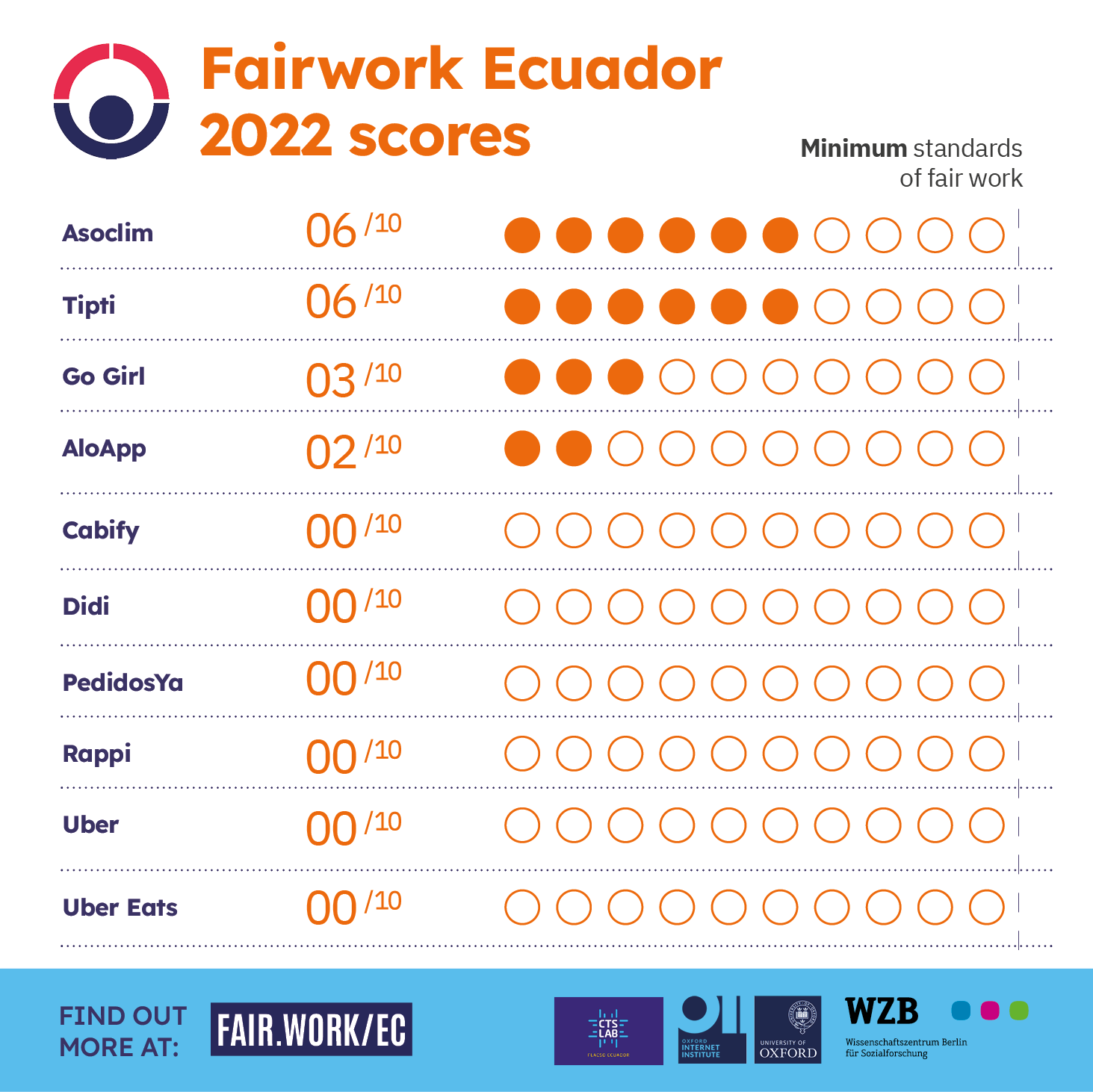This website uses cookies so that we can provide you with the best user experience possible. Cookie information is stored in your browser and performs functions such as recognising you when you return to our website and helping our team to understand which sections of the website you find most interesting and useful.
Second Fairwork Ecuador Report Out Now: How Fair is work in the Ecuadorian Platform Economy?

Across a number of sectors, the ‘Fairwork Ecuador Ratings 2022: Labour Standards in the Platform Economy’ report evaluates the working conditions of 10 prominent platforms.
During 2020, Ecuador’s GDP took a steep dive of –7.8% and has yet to recover to pre-pandemic levels. In consequence, unemployment is up and informal work has reached an unprecedented high of 68% in 2022. Moreover, over half a million immigrants, mainly from Venezuela and Colombia, are struggling to find adequate work.
The platform economy, however, has profited handsomely during the pandemic. The market looks to have doubled to between three and four million users and the workforce to have expanded by 38%, up to approximately 55,000 workers. Indeed, it is delivery platforms which have benefited the most, seemingly by using the pandemic as a window of opportunity to upscale operations and either take a new share of the market or increase an existing one.
Thus, a selection of prominent players in the Ecuadorian platform economy have been scored out ten against five principles of fair work – Fair Pay, Fair Conditions, Fair Contracts, Fair Management, and Fair Representation. Evidence collected through desk research, interviews with workers, and platform-provided evidence has been used to determine the Fairwork scores out of ten assigned to Asoclim, Tipti, Go Girl, AloApp, Cabify, Didi, PedidosYa, Rappi, Uber, and Uber Eats.
With 6/10 each, Asoclim and Tipti lead the ratings; Go girl is second with 3/10; AloApp third with 2/10 and the remaining platforms, Cabify, Didi, PedidosYa, Rappi, Uber, and Uber Eats, all scored 0. While local platforms Asoclim and Tipti offer better working conditions than the transnationals, there is still vast room for improvement across the board.
The majority of Ecudaorian workers lack basic benefits and protections and although public concern and the general socioeconomic crisis have pushed the government to initiate some legal and institutional reforms aimed at reshaping the labour market and eliminating the grey areas where these platforms have proliferated, working conditions still lag behind.

Key Findings
Fair Pay: This year only two platforms (Tipti and AloApp) could evidence that workers’ net income after work-related costs is at or above the minimum wage, which in 2022 is set at 425 USD a month. None of the platforms could evidence that they ensured a living wage.
Fair Conditions: This year only one delivery platform, Tipti, was awarded the first point because it was able to evidence some action taken to protect workers from risks that arise in their jobs, providing evidence of its efforts to improve working conditions, including loss-of-earnings compensation for workers, health insurance, and accidents insurance. No platform was awarded the second point.
Fair Contracts: Only three platforms were awarded the first point: Asoclim, Tipti and Go Girl. An important criterion for awarding points for fair contracts is that the platforms utilise Ecuadorian law as the basis for addressing worker-related issues. Five of the ten platforms we evaluated conform to the legal jurisdictions of other countries and no platform was able to provide evidence that the contract does not unreasonably exclude liability on the part of the service user and/or the platform however.
Fair Management: Workers can face deactivation from platforms for arbitrary reasons, without due process, which is a big concern. Only Tipti has codified its deactivation policies, thereby providing workers greater recourse.
Fair Representation: Only Asoclim was awarded both points for this principle. This platform operates with a social business model based on cooperativism, where each of the workers is a member of the platform and operates in a context of equality and access to decision-making. No other platform could meet the criteria for fair representation.
As part of Fairwork’s commitment to making platforms accountable for their labour practices, we have launched the Fairwork Pledge. This pledge aims to encourage other organisations to support decent labour practices in the platform economy, guided by the five principles of fair work.
Organisations like universities, schools, businesses, investors and charities that make use of platform labour can make a difference by supporting platforms that offer better working conditions.
Organisations have the option to sign up to the Pledge as an official Fairwork Supporter or an official Fairwork Partner. Those signing up to be a Supporter must demonstrate their support for fairer platform work publicly and provide their staff with appropriate resources to make informed decisions about what platforms to use. Becoming a Fairwork Partner entails making a public commitment to implement changes in their own internal practices, such as committing to using better-rated platforms when there is a choice.
The Oxford Internet Institute, The University of Oxford School of Geography and the Environment, The Church of England Diocese of Oxford, the Good Business Charter, The New Economics Foundation and Meatspace Press have already signed the pledge. Join them in demanding a fairer future of work.
